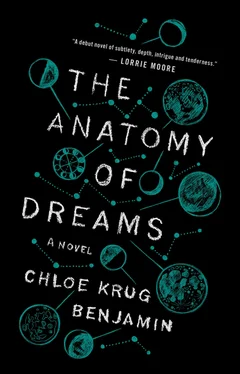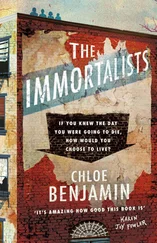CCWF is the largest female correctional facility in the United States. It houses the state of California’s death row for women.
“Jesus Christ,” said Gabe. He set the paper down and stared at it for a beat before looking up at Keller.
“I knew this would happen,” I said. “I knew it.”
We were quiet. Something seemed to rise and spread between us like toxic gas. In the hall behind us, a toilet flushed, and two girls came out of the bathroom, their arms linked. The taste of bile climbed my throat.
“Well, what do we do?” asked Gabe. “What the fuck do you suggest we do?”
It took a moment for me to realize he was talking to Keller. I’d known Gabe to quibble with Keller, tease him, even, but I’d never heard him use this kind of language. Keller looked at him evenly, his head slightly bowed.
“I suggest,” he said in a low tone, “that you don’t pick up the phone unless you’re sure the call is from one of us. Let everything else go to voice mail. If you’re contacted by anyone you don’t know—a reporter, a stranger, anyone—come to me immediately. I don’t care how innocuous it seems.”
“Jesus Christ ,” said Gabe. He ran his hands through his hair. “Okay, let’s think about this. Maybe it’s not so bad. It’s possible she wasn’t asleep, right? And even if she was, how could they possibly prove it?”
“She definitely wasn’t asleep,” said Keller.
“How do you know?” I asked.
“She couldn’t be. If you remember anything about Anne’s case, you’ll know that she was never a sleepwalker—her disorder most closely resembled RBD. She never left her bedroom. Her eyes were always closed. She was violent but clumsy. She had none of the fine motor skills required to operate a car or fill a vial of morphine.”
“That’s a good thing, right?” asked Gabe. “That she wasn’t sleeping? I mean, if she was awake when she committed those murders, how could our study have had anything to do with them?”
“It isn’t a good thing,” I said. “My God—do you really think we had no part in this? We knew exactly how violent she was. We gave her knowledge of her deepest impulses, and then we left her. We trusted her to know what to do with it.”
“We aim to help patients resolve their sleep disorders. But we’re not responsible for the knowledge they receive in lucidity training, nor the actions they take as a result of it,” said Keller tightly. “You know this as well as I do—it’s in our release.”
“Legally, maybe, but what about morally?” I asked. “I mean, isn’t that why we’re sitting here, freaking out? That disclaimer’s all well and good until somebody gets killed .”
“We were operating within the constraints of client-patient confidentiality,” said Keller. “Besides, RBD is characterized by unconscious outbursts of violence and self-defense. Nearly every patient we see shows these symptoms.”
“Yeah, but Anne was different,” said Gabe. “She was cagier. Manipulative. We all knew it.”
“Exactly,” I said. “We should have told somebody. We should have turned her in.”
“And what should have happened then?” asked Keller. “Should she have been arrested for dreaming of murder? Charged? Where would it stop? Imagine—people being rounded up and accused, not for what they’ve done, but what they dreamed of doing. It’s thoughtcrime, and we would have been the policemen.”
“Fine—but that still doesn’t mean we aren’t culpable. We held a mirror up to her mind and showed her what was inside it.” I felt nauseous, my head thick. “We gave her the idea.”
“That’s impossible to prove,” Keller said.
“But are you denying it?” asked Gabe.
A strange, new dynamic uncoiled itself between us: Keller leaning slightly back, Gabe and I staring at him hungrily. Hungry for what? For him to admit some wrongdoing? For him to crack?
Keller was silent, staring at a spot behind our heads, either lost in thought or ignoring us completely. For a moment, I thought he wasn’t going to reply; then he opened his mouth and exhaled, a rattle of a sound.
“I don’t know,” he said, articulating each word carefully, and somehow this was worse, more humiliating, than a denial.
I thought of Jamie: his tufted hair, his limbs straining against our straps, his shoes blinking red as he walked away from us. And I remembered something else: a warm night in September, a locket hanging from an index finger. My first conversation with Thom.
Couldn’t what begins as an exercise in self-knowledge actually reveal our darkest impulses? he’d asked. Once we experience our dreams—not via recollection, but right there in the moment—how long is it before we start to believe that this is who we really are, what we really want, how we really feel? When does one’s dream consciousness become their consciousness, I mean? Maybe the dreams themselves aren’t dangerous. Maybe what’s dangerous is putting people in contact with them.
“Oh my God,” I said, leaning back in my chair. “Thom was right.”
Gabe had been staring at the wall, dazed, but now his eyes narrowed.
“Thom was right?” he repeated. “You talked to Thom about our research?”
“Well, you talked to Janna.”
“She asked me about it. That’s different. I didn’t tell her shit.”
“What’s going on?” asked Keller. “Who’s Thom? Who’s Janna?”
Neither one of us answered immediately. But Keller looked stricken, as if we had betrayed him, and Gabe caved first.
“Our neighbors,” he said.
“I have told you,” said Keller, “countless times—”
“Yeah, we know.” Gabe’s voice was tired, flat. “The first rule of Fight Club is that you don’t talk about Fight Club.”
Keller was rigid. “This is hardly the time to joke, Gabriel.”
“Who’s joking?” said Gabe. “If they subpoena our files—if they find out what we knew—we’re fucked. We could be implicated.”
He slammed the heel of his hand on the table. The students sitting closest to us looked up, but nobody else paid much attention. They probably mistook Gabe and me for siblings, undergrads, and Keller for our father. A family tiff, they would think—our father come to pick us up after finals, Gabe edgy from that morning’s exam.
“They won’t subpoena her file,” said Keller.
“Why not?” asked Gabe.
“Because I’ve gotten rid of it.”
He was very calm. We stared at him.
“That’s just great,” said Gabe. “That’s really great, Adrian. And what’s our excuse?”
“A fire at the lab in Fort Bragg. Some combustible substance—kerosene, naphthalene, one of the pyrophorics. An act of carelessness, to be sure, but an ordinary accident.” Keller took off his glasses and set them down on the table on their delicate, spidery legs. He rubbed the bridge of his nose. “Though I’m open to other ideas, if you have them.”
“What if you have to testify?” I asked.
“Then I will,” said Keller. “The publicity is not necessarily the issue—it’s what kind of publicity it is. I have no problem speaking on behalf of our research. And if you find yourself in a similar situation, be sure to make it clear that the March case was entirely ordinary. Underwhelming, even. We worked with her for eight weeks, during which she couldn’t attain a lucid dream state. Because she was unable to meet the demands of the study, we released her.”
“And what if she tells them otherwise?” I asked. “She was lucid.”
“A little too lucid,” muttered Gabe.
“With an insanity defense,” said Keller, “I can’t see that sort of inconsistency as being much of a problem.”
Читать дальше












